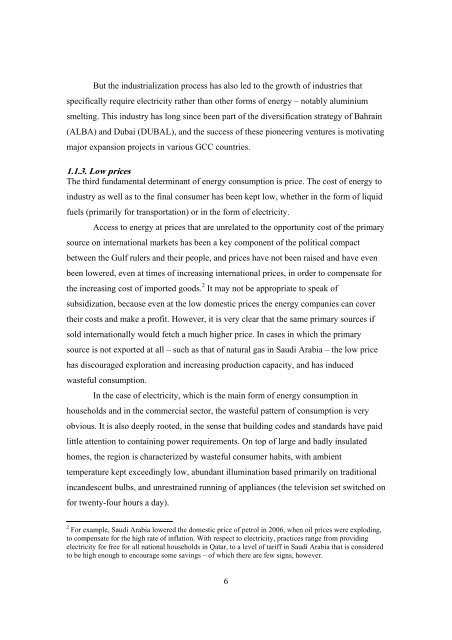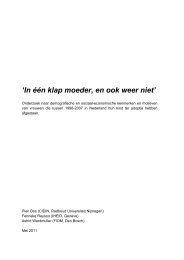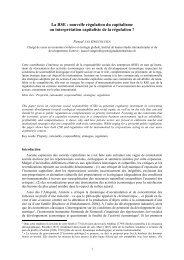PDF - Graduate Institute of International and Development Studies
PDF - Graduate Institute of International and Development Studies
PDF - Graduate Institute of International and Development Studies
You also want an ePaper? Increase the reach of your titles
YUMPU automatically turns print PDFs into web optimized ePapers that Google loves.
But the industrialization process has also led to the growth <strong>of</strong> industries that<br />
specifically require electricity rather than other forms <strong>of</strong> energy – notably aluminium<br />
smelting. This industry has long since been part <strong>of</strong> the diversification strategy <strong>of</strong> Bahrain<br />
(ALBA) <strong>and</strong> Dubai (DUBAL), <strong>and</strong> the success <strong>of</strong> these pioneering ventures is motivating<br />
major expansion projects in various GCC countries.<br />
1.1.3. Low prices<br />
The third fundamental determinant <strong>of</strong> energy consumption is price. The cost <strong>of</strong> energy to<br />
industry as well as to the final consumer has been kept low, whether in the form <strong>of</strong> liquid<br />
fuels (primarily for transportation) or in the form <strong>of</strong> electricity.<br />
Access to energy at prices that are unrelated to the opportunity cost <strong>of</strong> the primary<br />
source on international markets has been a key component <strong>of</strong> the political compact<br />
between the Gulf rulers <strong>and</strong> their people, <strong>and</strong> prices have not been raised <strong>and</strong> have even<br />
been lowered, even at times <strong>of</strong> increasing international prices, in order to compensate for<br />
the increasing cost <strong>of</strong> imported goods. 2 It may not be appropriate to speak <strong>of</strong><br />
subsidization, because even at the low domestic prices the energy companies can cover<br />
their costs <strong>and</strong> make a pr<strong>of</strong>it. However, it is very clear that the same primary sources if<br />
sold internationally would fetch a much higher price. In cases in which the primary<br />
source is not exported at all – such as that <strong>of</strong> natural gas in Saudi Arabia – the low price<br />
has discouraged exploration <strong>and</strong> increasing production capacity, <strong>and</strong> has induced<br />
wasteful consumption.<br />
In the case <strong>of</strong> electricity, which is the main form <strong>of</strong> energy consumption in<br />
households <strong>and</strong> in the commercial sector, the wasteful pattern <strong>of</strong> consumption is very<br />
obvious. It is also deeply rooted, in the sense that building codes <strong>and</strong> st<strong>and</strong>ards have paid<br />
little attention to containing power requirements. On top <strong>of</strong> large <strong>and</strong> badly insulated<br />
homes, the region is characterized by wasteful consumer habits, with ambient<br />
temperature kept exceedingly low, abundant illumination based primarily on traditional<br />
inc<strong>and</strong>escent bulbs, <strong>and</strong> unrestrained running <strong>of</strong> appliances (the television set switched on<br />
for twenty-four hours a day).<br />
2 For example, Saudi Arabia lowered the domestic price <strong>of</strong> petrol in 2006, when oil prices were exploding,<br />
to compensate for the high rate <strong>of</strong> inflation. With respect to electricity, practices range from providing<br />
electricity for free for all national households in Qatar, to a level <strong>of</strong> tariff in Saudi Arabia that is considered<br />
to be high enough to encourage some savings – <strong>of</strong> which there are few signs, however.<br />
6




